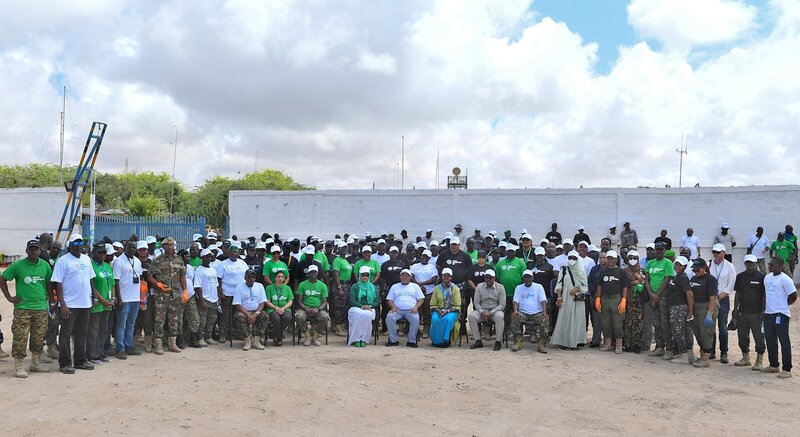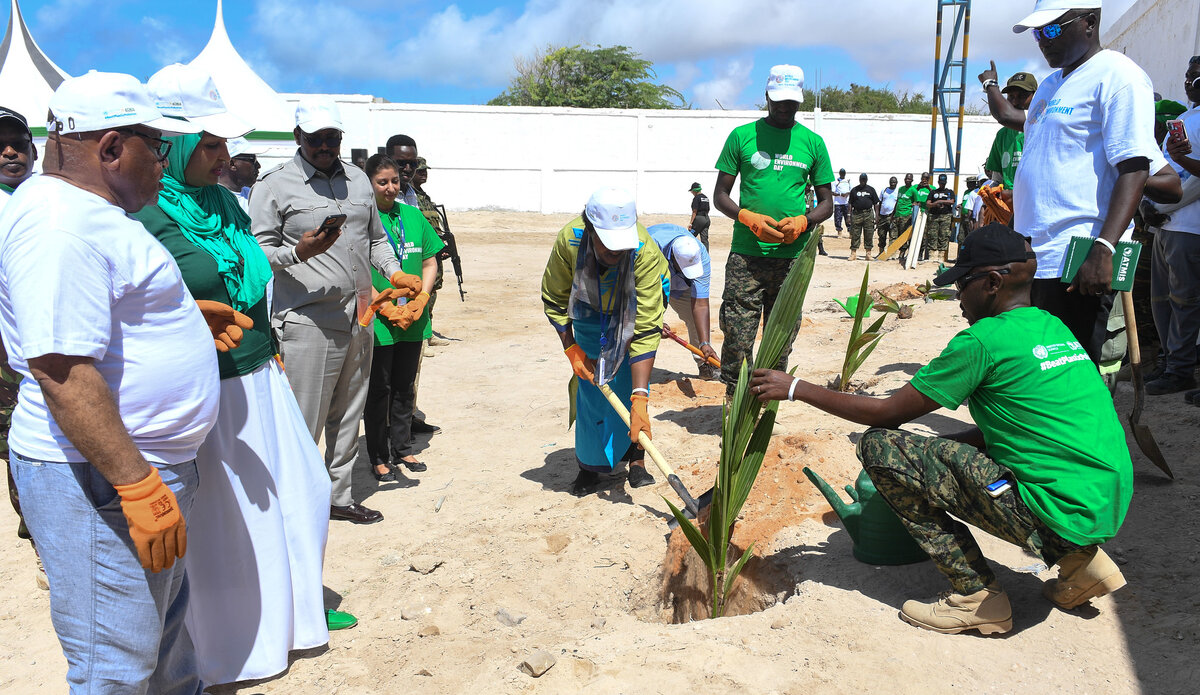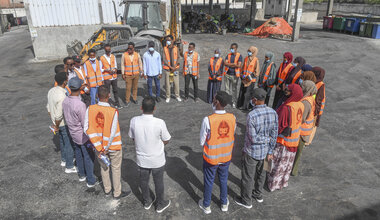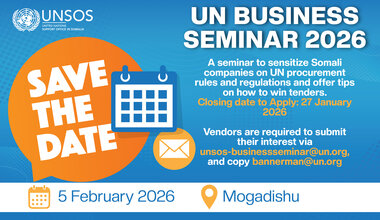UN, partners unveil campaign to green Somalia during World Environment Day
Mogadishu– Somalia’s goal of regenerating and protecting its ecosystem received a boost on World Environment Day with the launch of a UN supported tree planting campaign primarily aimed at reducing the effects of climate change.
In partnership with the African Union Transition Mission in Somali (ATMIS) and the Federal Government of Somalia (FGS), the Head of the UN Support Office in Somalia (UNSOS), Assistant Secretary-General Ms Aisa Kacyira praised an initiative to curb plastic pollution as a key part of this regeneration process.
“The UN in Somalia continues to minimize its plastic waste by prohibiting the use of plastic bags, reducing the use of plastic water bottles-by providing water dispensers in offices and maintaining drinking water points within our camps, providing waste bins to allow for the separation and recycling of trash and regularly organizing beach clean-ups. We gather two tonnes of waste for every clean up,” she said.

Ms Kacyira, with other senior dignitaries including Ambassador Mohammed El-Amine Souef, Head of the AU Mission in Somalia, and Somalia's Minister for Environment and Climate Change Khadija Mohamed, pledged to plant 30,000 trees at 58 Forward Operating Bases manned by ATMIS forces by the time AU forces exit the mission at the end of December 2024.
“As far as ATMIS is concerned, we are committed to follow the orientation and the policy of Somalia’s President. ATMIS will plant about 30,000 trees to support Somalia by making it green by December 2024,” said Amb. Souef.
The campaign is in solidarity with President Hassan Sheikh’s ‘Regreening Somalia’ Initiative launched in October last year. The target is to plant 10 million trees to boost biodiversity and climate resilience and help combat repeat cycles of devastating droughts in the Horn of Africa country.
During this year's anniversary, themed "Solution to Plastic Pollution," UN and ATMIS personnel took part in a plastics collection clean-up activities in Mogadishu and the regional towns of Jowhar, Baidoa and Dhobley.

“Plastic pollution is a real disaster and our health is affected by plastics everywhere. If you don’t take action today, it will be late tomorrow,” added Amb. Souef.
Khadija Mohamed, the Minister of Environment and Climate Change expressed Somalia’s appreciation for the collaborative efforts by the UN and ATMIS in supporting the Federal Government’s initiatives to protect the diverse ecosystem.
“Somalia has a great asset, it’s been blessed with a beautiful land, ocean, livestock and agriculture. But unfortunately, our ecosystem has been adversely affected by years of conflict, we need to stand together and act to tame pollution and fight plastics,” Minister Khadija Mohamed remarked.
In Jowhar, Benjamin Jonah, UN Assistance Mission in Somalia (UNSOM) head officer in Hirshabelle State, emphasized that the initiative is intended to raise awareness about climate change as result of the devastating droughts and flooding in the region.
“Within Hirshabelle state, we are aware that all the cities downstream have been severely impacted. The UN is collaborating with partners to raise awareness about the impact of climate change, provide capacity building services and advocate for funding initiatives to address the effects of climate change,” said Jonah.
The launch of the campaign followed a beach-clean up exercise last month, where UN and ATMIS personnel took part in cleaning up the beach in Mogadishu at the Halane Basecamp.
“I encourage everyone, especially the local community, to cut back on plastic consumption because it is the only way to safeguard the ocean,” noted Richard Oyoo, UNSOS Environmental Officer.
Globally, the oceans are choking under tons of plastic debris which drift under water currents. Much is then deposited along Africa’s coastlines thousands of kilometres from its area of origin. Experts warn that in another decade, the oceans will soon have more plastic than fish unless humankind changes its behaviour.
“We can only protect the ocean if we control the source. We need to make an effort at the source,” added Oyoo.

 UN
UN





